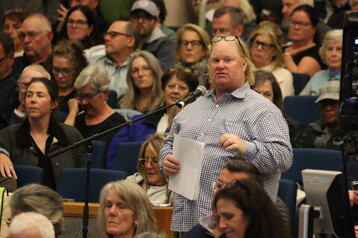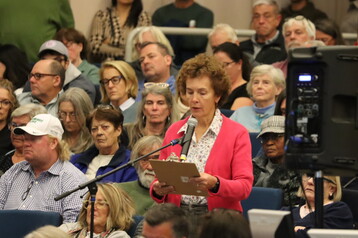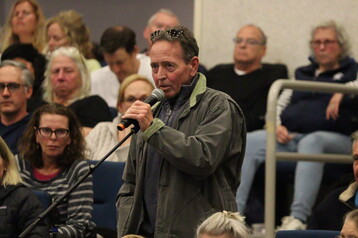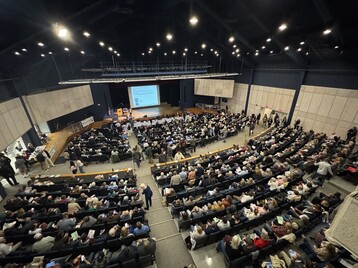Island Voters Legalize Short-Term Rentals Without Restrictions
JohnCarl McGrady •

Nantucket's five-year stalemate over short-term rentals has ended.
During Tuesday night's Special Town Meeting, Article 1, which legalizes short-term rentals (STRs) by right across Nantucket, was passed by a vote of 1045 - 421, clearing the two-thirds threshold needed for adoption with 71 percent support. The passage of Article 1 was the culmination of a divisive five-year debate over whether to restrict short-term rentals, and essentially kills existing legal challenges of STRs on Nantucket.
For years, advocates of both permissive and restrictive STR regulations have battled under the shadow of a lawsuit that could have seen the large majority of STRs on the island banned, fueling fear and uncertainty. But Article 1 clarifies the zoning dispute at the heart of the lawsuit, expressly permitting STRs as an allowed use in all zoning districts, with the exception of a specific commercial-industrial district found primarily around Nantucket Memorial Airport.
“There's just too much economic and legal uncertainty with what's happening with the judges,” Article 1 sponsor and charter boat captain Brian Borgeson said at Tuesday’s meeting. “There is a ton of uncertainty. People believe they are not allowed to rent on Nantucket. If we don't decide tonight, an off-island judge has the ability to shut down what we do.”
Borgeson's proposal was one of two articles on the warrant. The other, sponsored by Planning Board chair Dave Iverson, would have imposed a series of restrictions on STRs. But after Town Meeting voters approved Article 1, they then voted overwhelmingly to take no action on Article 2, at Iverson’s request.
“Article Two represents durable regulations that represent to the people watching a step back and a deep breath,” Iverson said during the meeting, before the vote on Article 1. “It says, maybe I'm not all right with what's going on. I think it's important for us as a community to make a choice.”

The passage of Article 1 is a major win for the property rights advocates, short-term rental operators, business owners, real estate professionals, and land use specialists who have long pushed for full codification, arguing it is necessary to protect Nantucket’s economy and the property rights of local island residents. It’s also a reversal of past votes, which saw two attempts at full codification rejected and several others tabled or referred for further study.
“Article One provides the clearest, most responsible path forward for Nantucket, codifying short-term rentals within zoning and bringing long overdue legal clarity and stability to homeowners, renters and the town's finances,” Finance Committee chair Jill Vieth told the voters Tuesday. “The town is already spending hundreds of thousands of dollars, taxpayer dollars, defending ongoing litigation, money we could be spending on our essential services, schools, infrastructure, town employees, housing and broader community engagement.”

On the other side of the debate, the proponents of stricter regulation - including the political action group ACK Now - will have to change their strategy sharply. No longer can they attempt to tack regulations onto proposals that would provide legal protection for STRs in the hope of gaining the support of worried STR operators and advocates afraid that the looming legal case could disrupt the market. The basis for their previous lawsuits, arguing that short-term rentals are an illegal commercial use in residential zoning districts, is now moot.
“[Article One] invites off-island investors and speculators to stuff their pockets at the expense of local homeowners that are eager to rent. It diverts a lot of money off island,” Madaket resident Jocelyn Duffy said, speaking in favor of restrictions and against Article 1 at Tuesday’s meeting. “Article One opens the gates to a frenzy of home buying by off-islanders creating mini-hotels.”

Nantucket voters have already banned corporate ownership of short-term rentals, and passed a series of regulations that include mandatory registration, fees, and compliance with health and safety rules.
The passage of Article 1 broke a deadlock over the zoning bylaw governing short-term rentals that had spanned seven Town Meetings and flummoxed every major local government board, professional facilitators, political action groups, highly trained attorneys, and a number of local leaders. It does not, however, mean that STRs will fade into the background of local politics.
It is quite possible that there are already efforts underway to submit further STR regulation proposals for next year’s Annual Town Meeting. Even if the timeline is too tight, it is extremely unlikely that future Town Meetings will be free of such proposals.
What is likely settled, however, is the years-long legal fight over Peter and Linda Grape’s right to short-term rent their Silver Street home. That lawsuit is being funded by ACK Now, which had endorsed Article 2.

In the suit, Nantucket resident Cathy Ward had alleged that Nantucket’s zoning code didn’t allow short-term rentals as a principal use in residential districts. Land Court Judge Michael Vhay sided with Ward twice, throwing Nantucket's zoning regulations pertaining to STRs into uncertainty. That uncertainty is now resolved.
The most recent attempt at full codification, at last spring’s Annual Town Meeting, secured majority support, but was unable to crack the two-thirds threshold needed for adoption. Article One proved different, possibly because of Vhay’s second ruling, which could have significantly disrupted Nantucket’s tourism industry.
With the legal question settled, the regulatory fight could now turn to general bylaws. Much of the substance of Article 2, which was not seriously debated Tuesday after the passage of Article 1, could be contained in a general bylaw, which would only need a simple majority to pass. This is the avenue groups like Nantucket Neighborhoods First and the Nantucket Land and Water Council, two of the most notable proponents of stricter STR restrictions, may pursue going forward.
The other consequences of Article 1's passage are less clear. Some opponents have warned that formally allowing STRs could cause an explosion of unwanted STR activity on island. Proponents have argued that full codification could provide the island with an economic windfall, or at least prevent an economic collapse. It will be at least a year before the actual outcomes begin to come into focus.
“I'm concerned that if Article One does not pass, we will see an immediate and precipitous drop in shoulder season commerce. This is because the term short-term rentals encompasses a majority of the housing options available to people outside of the July and August months,” local event planner Maggie Stewart said during Tuesday's meeting. “I'm also concerned that failing to pass this article will only serve the ultra-wealthy retired homeowners who are simply looking to have a quiet place to vacation at the expense of the working-class families and year-round people that truly make this island worth visiting in the first place.”


One less discussed possible consequence of Article One passing is fewer STMs. The last three Nantucket has held, including Tuesday’s, were primarily focused on STRs. With a zoning bylaw now on the books (assuming it is approved by the state Attorney General), the incentive to call STMs should diminish. Nantucket has now seen an STM for three years in a row after not seeing any for the four-year period from 2019-2022.